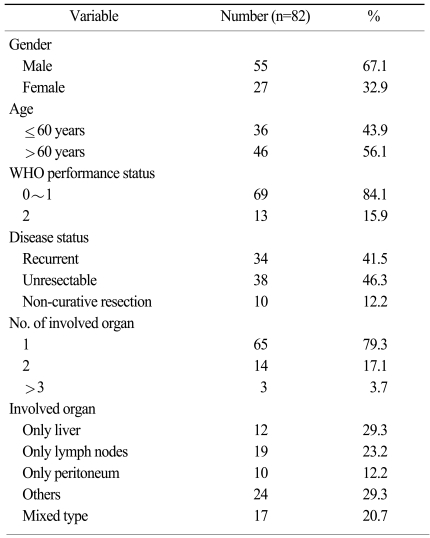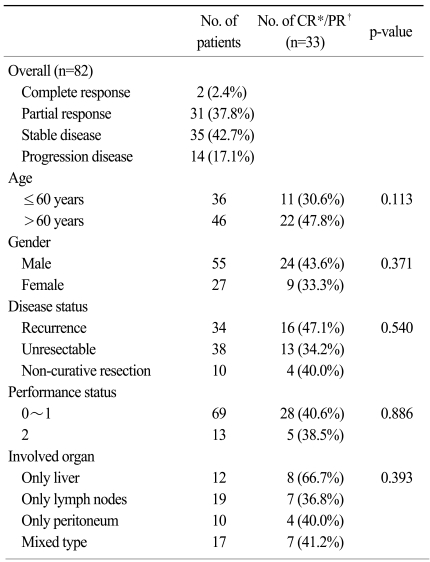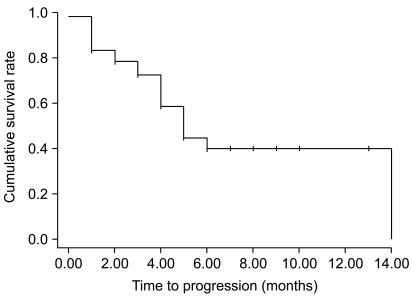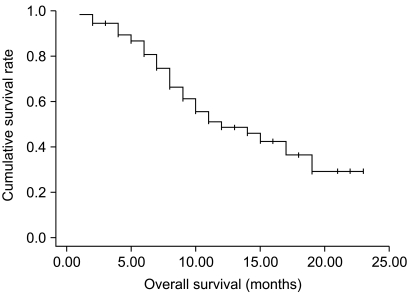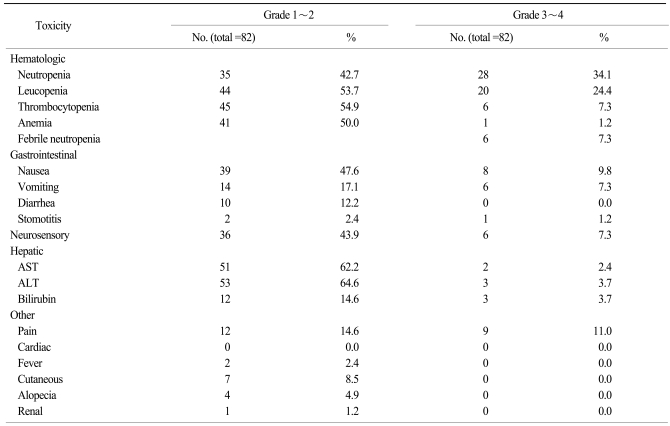Abstract
Purpose
Treatment options for patients with advanced gastric cancer remain limited. Few studies have investigated the efficacy and tolerability of the combination regimen of oxaliplatin and 5-fluorouracil with leucovorin for patients with advanced gastric cancer. The goal of this study was to examine the efficacy and toxicity of a modified FOLFOX-6 (mFOLFOX-6) regimen as a first-line chemotherapy regimen for patients with advanced gastric cancer.
Materials and Methods
From March, 2006, to December, 2007, 82 patients with advanced gastric cancer received 100 mg/m2 oxaliplatin and 100 mg/m2 leucovorin on the first day of treatment, followed by 2,400 mg/m2 of 5-fluorouracil on the first and second days of treatment every 2 weeks as a first-line treatment.
Results
The median age of the enrolled patients was 62 years (range; 30~75). Out of 82 patients, 34 cases (41.5%) were recurrent cases after curative resection, and the other 48 cases were unresectable or non-curative resectable cases. Their response was evaluated every 6 weeks. The overall response rate was 40.2%, with 2 (2.4%) complete response and 31 (37.8%) partial responses. The median time to progression (TTP) and overall survival (OS) time were 6.0 months (95% confidence interval [CI]: 4.69~7.31) and 13.0 months (7.99~18.0), respectively. The grade 3~4 hematologic toxicities observed included neutropenia (34.1%), thrombocytopenia (7.3%), and anemia (1.2%). The gastrointestinal toxicities observed included grade 3~4 nausea (9.8%) and vomiting (7.3%). Six patients (7.3%) experienced grade 3 neuropathy. No treatment-related deaths were recorded.
Conclusion
The modified FOLFOX-6 regimen is effective and well tolerated as a first-line chemotherapy regimen for patients with advanced gastric cancer.
Keywords: Stomach neoplasms, Adjuvant chemotherapy, Oxaliplatin, FOLFOX regimen
Introduction
Increasing early diagnosis of gastric cancer has improved the survival rate. However, the prognosis for recurrent or unresectable gastric cancer remains poor. Various chemotherapy regimens have been developed for advanced gastric cancer patients based on the understanding that chemotherapy can increase the length and quality of life (1). However, only 10% of patients treated with chemotherapy survive for longer than 2 years (2).
The older-generation 5-fluorouracil (FU) and cisplatin-based combination regimens have proven unsatisfactory, with a response rate of only 11% to 20%, and a median survival time ranging between 6 and 8 months (3,4). In recent randomized trials of a new-generation regimen with oral 5-FU and irinotecan, the overall response rate ranged from 25% to 41% (5,6). However, there remains no standard chemotherapeutic regimen for advanced gastric cancer due to concerns of chemotherapy-induced toxicity and inconsistent treatment responses.
Oxaliplatin, a new-generation alkylating agent that inhibits DNA replication, is efficacious in combination with 5-FU for advanced colorectal cancer (7,8) and potentially in colorectal gastrointestinal tumors (9). Several phase II clinical trials have demonstrated an overall response rate ranging from 42% to 49% for treating advanced gastric cancer with oxaliplatin combined with 5-FU and folic acid (7,10,11). However, the dose of oxaliplatin and combination agents can affect response rate, survival, and toxicity.
The goal of this retrospective study was to report the efficacy and toxicity of a modified FOLFOX-6 (mFOLFOX-6) regimen as a firstline chemotherapy regimen in patients with advanced gastric cancer. Specifically, this study investigated the effect of a biweekly protocol of 100 mg/m2 oxaliplatin combined with 2.4 g/m2 5-FU (46-hour continuous infusion) and 100 mg/m2 folic acid on the response, survival, and toxicity rates of recurrent and unresectable gastric cancer.
Materials and Methods
1. Eligibility criteria
Patients diagnosed with recurrent gastric cancer after initial curative resection or presented with unresectable tumor at diagnosis were administered the mFOLFOX-6 regimen as a first-line chemotherapy regimen. The eligibility criteria were: age between 18 and 75 years; WHO performance status of two or less; life expectancy longer than 3 months; and adequate hepatic, renal, and bone marrow function. Patients were excluded from the study if they had peripheral neuropathy of National Cancer Institute common toxicity criteria (NCI-CTC) grade ≥2. Patients provided written informed consent before treatment that contained information on chemotherapy drug, treatment schedule, and toxicity.
2. Chemotherapy
The treatment consisted of 100 mg/m2 oxaliplatin and 100 mg/m2 leucovorin administered during a 2-hour intravenous infusion, followed by 2,400 mg/m2 5-FU administered during a 46-hour continuous infusion. The cycles were repeated every 2 weeks and the chemotherapy was continued unless the disease progressed, the patient developed severe grade 4 toxicity, the patient refused further treatment, or the patient's physician decided to terminate treatment. Toxicity was graded according to the NCI-CTC version 2 and peripheral neuropathy was evaluated by the oxaliplatin-specific scale (12). Chemotherapy was delayed for up to 14 days when neutrophil count <1,500 mm3 and/or platelet count <100,000 mm3. The dose of oxaliplatin was reduced by 20% in cases of painful paresthesia lasting longer than 7 days. The dose of 5-FU was reduced by 20% for grade 3~4 gastrointestinal toxicities.
3. Assessment of response
Responses were classified according to Response Evaluation Criteria in Solid Tumors (RECIST) criteria. Chest radiography, abdominal ultrasound (US), and computed tomography (CT) scans of measurable lesions were performed after every 3 cycles. Responses were confirmed by subsequent CT scans every 4 to 6 weeks after the initial response documentation. The time to response was measured from the initiation of treatment until response documentation, and the response duration was measured from the time of response documentation until progression. The time to progression (TTP) was measured from the initiation of treatment until progression, and the overall survival (OS) was measured from the initiation of treatment until death.
4. Statistical analysis
Comparisons of response rates according to clinical factors were evaluated by Pearson chi-square analysis. Response duration, TTP, and OS were calculated according to the Kaplan-Meier method.
Results
1. Patient characteristics
Eighty-two patients were enrolled in this retrospective study from March, 2006, to December, 2007. The median age of the enrolled patients was 62 years (range, 30~75). Thirty-four patients (41.5%) had a recurrence after curative resection and 48 patients (58.5%) had advanced gastric cancer that was impossible to resect curatively at of the initial diagnosis. Most patients (96.4%) had one or two involved regions, and their most common target lesion was a local or distant lymph node (Table 1).
Table 1.
Patients' characteristics
2. Response
Response to treatment was evaluated every 6 weeks. The median follow-up duration was 8.0 months (range: 2.0~23.0 months) and median number of follow-ups was 13 times (range: 3~35 times). The overall response rate was 40.2%, with 2 patients (2.4%) experiencing a complete response and 31 patients (37.8%) experiencing a partial response (Table 2). The median time to response was 1.5 months (range: 1.5~3.0 months), and the median response duration was 5.5 months (95% CI: 3.74~7.27). The median TTP and OS were 6.0 months (95% CI: 4.69~7.31; Fig. 1) and 13.0 months (95% CI: 7.99~18.0; Fig. 2), respectively.
Table 2.
Response according to clinical factors
*complete response, †partial response.
Fig. 1.
Kaplan-Meier curve for time to progression. The median time to progression was 6.0 months (95% CI; 4.69~7.31). CI, confidence interval.
Fig. 2.
Kaplan-Meier curve for overall survival. The median survival time was 13.0 months (95% CI; 7.99~18.00). CI, confidence interval.
3. Toxicity
Grade 3~4 hematologic toxicities included neutropenia (34.1%), thrombocytopenia, (7.3%), and anemia (1.2%). Gastrointestinal toxicities included grade 3~4 nausea (9.8%) and vomiting (7.3%). Six patients (7.3%) experienced grade 3 neuropathy. No treatment-related deaths were recorded (Table 3).
Table 3.
Toxicities according to the national cancer Institute common toxicity criteria
NCI-CTC grade version 2.0.
4. Dose intensity
Relative dose intensities of oxaliplatin and 5-FU infusion were 93.7% (93.7 mg/m2/2 weeks) and 91.3% (2,191 mg/m2/2 weeks), respectively. Relative dose intensity of oxaliplatin in 6 patients with grade 3 neuropathy was 87.7% (87.7 mg/m2/2 weeks).
Discussion
As a primary treatment for recurrent or advanced gastric cancer, a regimen of oxaliplatin combined with 5-FU and leucovorin showed an acceptable response rate and tolerable toxicity in three phase II clinical trials, but the insufficient number of patients restricts any definitive conclusions (10,11,13). Based on response and tolerance rates, patients with recurrent or advanced gastric cancer who presented with unresectable disease received the mFOLFOX-6 regimen as a first-line treatment. Eighty-two patients were enrolled in this study, more than previous phase II trials, and showed an acceptable response rate (40.2%) and tolerance. Age was evenly distributed, with 36 patients (43.9%) between 60 and 75 years of age and 46 patients (56.1%) less than 60 years of age, all with relevant WHO performance status, life expectancy, and internal organ function, allowing statistical analysis of efficacy and toxicity.
The combination of a platinum analogue and 5-FU is still the most widely used regimen in advanced gastric cancer. In Europe, two triplet regimens-5-FU, doxorubicin, and methotrexate (FAMTX) and epirubicin, cisplatin, and 5-FU (ECF)-are commonly used, but response rates and overall survival are not different than double regimens (14). New cytotoxic agents, including docetaxel, irinotecan, oxaliplatin, capecitabine, and S-1, have been developed, and many clinical trials containing these new agents have been conducted. Although docetaxel has demonstrated improved response rates and TTP for advanced gastric cancer, it causes serious toxicity (6). Irinotecan has demonstrated no definite advantage in efficacy compared to cisplatin (15). The results of a Japanese trial (JCOG9912, SPIRITS) and a REAL-2 study demonstrated that S-1 or capecitabine can substitute for 5-FU and that oxaliplatin can substitute for cisplatin (5,16,17). However, no standard regimen has been established for advanced gastric cancer.
Oxaliplatin is a platinum derivative in the same family as cisplatin and carboplatin. Although the exact mechanism of oxaliplatin remains unclear, the cytotoxicity of platinum compounds results from inhibition of DNA synthesis. Oxaliplatin is typically administered in combination with fluorouracil and leucovorin in a combination known as FOLFOX for the treatment of colorectal cancer. Previous studies of the FOLFOX regimen for treating advanced colorectal cancer have demonstrated an overall response rate of over 40% and successful progression-free survival (18,19). The hematologic toxicities most frequently reported for the FOLFOX regimen in colorectal cancer are anemia and neutropenia, and the most frequent non-hematologic toxicities are nausea, vomiting, diarrhea, and peripheral neuropathy. The neuropathy of the FOLFOX regimen primarily manifests as an acute, reversible sensitivity to cold and numbness or tingling in the hands and feet.
The response rate and TTP in this study are comparable to those found in previous phase II trials of oxaliplatin combined with 5-FU and leucovorin for patients with advanced gastric cancer (Table 4;10,11,13,20). The response rate in this study (40.2%) was somewhat lower than previous studies (42.9~48%), but the proportion of stable disease (42.7%) was higher and there was less disease progression (17.1%). The median TTP in this study (6.0 months) was similar to other studies (5.6~6.2 months). Surprisingly, the median OS in this study was 13.0 months, higher than previous studies (8.6~10.8 months), potentially because all patients received the mFOLFOX-6 regimen initially after cancer recurrence or diagnosis. Additional reasons for increased survival could be the increased efficacy of the second-line or subsequent therapy as well as the rather strict eligibility criteria and favorable patient characteristics. Forty patients (48.8%) received second-line chemotherapy, mostly due to progression of disease during follow up after first-line chemotherapy. A FOLFIRI regimen was administered as second-line chemotherapy in 24 patients (60%). The FOLFIRI regimen, a good alternative to a FOLFOX regimen, has demonstrated efficacy and safety for metastatic colorectal cancer (18). The others received docetaxel, paclitaxel, and S-1.
Table 4.
Comparison with previous FOLFOX-6 phase II study results
*time to progression, †overall survival, ‡response rate, §stable disease.
The cumulative oxaliplatin dosage of 800 to 1,000 mg/m2 results in reversible sensory neuropathy, which is the most serious and common complication of chemotherapy schedules in most trials using a FOLFOX regimen, and leads to the chemotherapy discontinuation. In many phase II studies with a FOLFOX regimen for recurrent or advanced gastric cancer, oxaliplatin (85 mg/m2) combined with leucovorin, continuous infusion 5-FU, and sometimes bolus 5-FU was used (13,20-22). Louvet et al. obtained a favorable response rate (45%) and TTP (6.2 months) with oxaliplatin (100 mg/m2), leucovorin (400 mg/m2), bolus 5-FU (400 mg/m2), and continuous infusion 5-FU (3,000 mg/m2), but showed a higher incidence of grade 3 neuropathy (21%) than other studies, with more grade 3~4 hematologic toxicities (11), including anemia (11%), neutropenia (38%), and leucopenia (19%).
This study used a modified FOLFOX-6 regimen with a high dose of oxaliplatin (100 mg/m2) but did not use bolus 5-FU. High dose oxaliplatin improves the response rate and prolongs TTP in the treatment of advanced colorectal cancer (7). Moreover, the high oxaliplatin dose intensity and the low rate of toxicity were demonstrated in several FOLFOX studies of advanced colorectal cancer (23). In this study, the notable grade 3~4 toxicities were neutropenia (34.1%), leucopenia, (24.4%), nausea (9.8%), and vomiting (7.3%). Only 6 patients (7.3%) experienced grade 3 neuropathy, a proportion similar to that of FOLFOX regimens administering 85 mg/m2 oxaliplatin. Moreover, the dose intensity of oxaliplatin of 93.7 mg/m2/2 weeks verified the feasibility of high dose oxaliplatin. These results indicate that a mFOLFOX-6 regimen of 100 mg/m2 oxaliplatin is as safe and effective as other FOLFOX regimens for patients with unresectable or recurrent gastric cancer.
Conclusion
The results of this retrospective study demonstrate that a regimen consisting of a high dose of oxaliplatin and 5-FU combined with leucovorin is effective as a first-line treatment and has an acceptable toxicity profile for patients diagnosed with recurrent or advanced gastric cancers. Further prospective randomized studies to determine the most effective and tolerable dosage of oxaliplatin and to compare conventional and current regimens would be warranted.
References
- 1.Glimelius B, Ekstrom K, Hoffman K, Graf W, Sjoden PO, Haglund U, et al. Randomized comparison between chemotherapy plus best supportive care with best supportive care in advanced gastric cancer. Ann Oncol. 1997;8:163–168. doi: 10.1023/a:1008243606668. [DOI] [PubMed] [Google Scholar]
- 2.Janunger KG, Hafstrom L, Nygren P, Glimelius B. A systematic overview of chemotherapy effects in gastric cancer. Acta Oncol. 2001;40:309–326. doi: 10.1080/02841860151116385. [DOI] [PubMed] [Google Scholar]
- 3.Kohne CH, Wils JA, Wilke HJ. Developments in the treatment of gastric cancer in Europe. Oncology (Williston Park) 2000;14(12 Suppl 14):22–25. [PubMed] [Google Scholar]
- 4.Wils J. Chemotherapy of metastatic gastric cancer. Gan To Kagaku Ryoho. 2000;27(Suppl 2):395–398. [PubMed] [Google Scholar]
- 5.Cunningham D, Starling N, Rao S, Iveson T, Nicolson M, Coxon F, et al. Capecitabine and oxaliplatin for advanced esophagogastric cancer. N Engl J Med. 2008;358:36–46. doi: 10.1056/NEJMoa073149. [DOI] [PubMed] [Google Scholar]
- 6.Van Cutsem E, Moiseyenko VM, Tjulandin S, Majlis A, Constenla M, Boni C, et al. Phase III study of docetaxel and cisplatin plus fluorouracil compared with cisplatin and fluorouracil as first-line therapy for advanced gastric cancer: a report of the V325 Study Group. J Clin Oncol. 2006;24:4991–4997. doi: 10.1200/JCO.2006.06.8429. [DOI] [PubMed] [Google Scholar]
- 7.de Gramont A, Figer A, Seymour M, Homerin M, Hmissi A, Cassidy J, et al. Leucovorin and fluorouracil with or without oxaliplatin as first-line treatment in advanced colorectal cancer. J Clin Oncol. 2000;18:2938–2947. doi: 10.1200/JCO.2000.18.16.2938. [DOI] [PubMed] [Google Scholar]
- 8.Goldberg RM, Sargent DJ, Morton RF, Fuchs CS, Ramanathan RK, Williamson SK, et al. A randomized controlled trial of fluorouracil plus leucovorin, irinotecan, and oxaliplatin combinations in patients with previously untreated metastatic colorectal cancer. J Clin Oncol. 2004;22:23–30. doi: 10.1200/JCO.2004.09.046. [DOI] [PubMed] [Google Scholar]
- 9.Becouarn Y, Agostini C, Trufflandier N, Boulanger V. Oxaliplatin: available data in non-colorectal gastrointestinal malignancies. Crit Rev Oncol Hematol. 2001;40:265–272. doi: 10.1016/s1040-8428(01)00169-x. [DOI] [PubMed] [Google Scholar]
- 10.Cavanna L, Artioli F, Codignola C, Lazzaro A, Rizzi A, Gamboni A, et al. Oxaliplatin in combination with 5-fluorouracil (5-FU) and leucovorin (LV) in patients with metastatic gastric cancer (MGC) Am J Clin Oncol. 2006;29:371–375. doi: 10.1097/01.coc.0000221358.57089.f2. [DOI] [PubMed] [Google Scholar]
- 11.Louvet C, Andre T, Tigaud JM, Gamelin E, Douillard JY, Brunet R, et al. Phase II study of oxaliplatin, fluorouracil, and folinic acid in locally advanced or metastatic gastric cancer patients. J Clin Oncol. 2002;20:4543–4548. doi: 10.1200/JCO.2002.02.021. [DOI] [PubMed] [Google Scholar]
- 12.Caussanel JP, Levi F, Brienza S, Misset JL, Itzhaki M, Adam R, et al. Phase I trial of 5-day continuous venous infusion of oxaliplatin at circadian rhythm-modulated rate compared with constant rate. J Natl Cancer Inst. 1990;82:1046–1050. doi: 10.1093/jnci/82.12.1046. [DOI] [PubMed] [Google Scholar]
- 13.Al-Batran SE, Atmaca A, Hegewisch-Becker S, Jaeger D, Hahnfeld S, Rummel MJ, et al. Phase II trial of biweekly infusional fluorouracil, folinic acid, and oxaliplatin in patients with advanced gastric cancer. J Clin Oncol. 2004;22:658–663. doi: 10.1200/JCO.2004.07.042. [DOI] [PubMed] [Google Scholar]
- 14.Ohtsu A. Chemotherapy for metastatic gastric cacner: past, present, and future. J Gastroenterol. 2008;43:256–264. doi: 10.1007/s00535-008-2177-6. [DOI] [PubMed] [Google Scholar]
- 15.Dank M, Zaluski J, Barone C, Valvere V, Peschel C, Wenczl M, et al. Andormized phase 3 trials of irinotecan (CPT-11)+5FU/folinic acid (FA) vs CDDP+5FU in 1st-line advanced gastric cancer patients. J Clin Oncol. 2005;23:16S. abstr 4003. [Google Scholar]
- 16.Boku N, Yamamoto S, Shirao K, Doi T, Sawaki A, Koizumi W, et al. Randomized phase III study of 5-fluorouracil (5-FU) alone versus combination of irinotecan and cisplatin (CP) versus S-1 alone in advanced gastric cancer (JCOG9912) J Clin Oncol. 2007;25:18S. (abstr LBA4513) [Google Scholar]
- 17.Narahara H, Koizumi W, Hara T, Takagane T, Akiya M, Takagi K, et al. Randomized phase III study of S-1 alone versus S-1+cisplatin in the treatment for advanced gastric cancer (the SPIRITS trials) SPIRITS: S-1 plus cisplatin vs S-1 in RCT in the treatment for stomach cancer. J Clin Oncol. 2007;25:18S. (abstr 4514) [Google Scholar]
- 18.Hebbar M, Tournigand C, Lledo G, Mabro M, Andre T, Louvet C, et al. Phase II trial alternating FOLFOX-6 and FOLFIRI regimens in second-line therapy of patients with metastatic colorectal cancer (FIREFOX study) Cancer invest. 2006;24:154–159. doi: 10.1080/07357900500524397. [DOI] [PubMed] [Google Scholar]
- 19.Kim JH, Oh DY, Kim YJ, Han SW, Choi IS, Kim DW, et al. Reduced dose intensity FOLFOX-4 as first line palliative chemotherapy in elderly patients with advanced colorectal caner. J Korean Med Sci. 2005;20:806–810. doi: 10.3346/jkms.2005.20.5.806. [DOI] [PMC free article] [PubMed] [Google Scholar]
- 20.Hwang WS, Chao TY, Lin SF, Chung CY, Chiu CF, Chang YF, et al. Phase II study of oxaliplatin in combination with continuous infusion of 5-fluorouracil/leucovorin as first-line chemotherapy in patients with advanced gastric cancer. Anticancer Drugs. 2008;19:283–288. doi: 10.1097/cad.0b013e3282f3fd17. [DOI] [PubMed] [Google Scholar]
- 21.De Vita F, Orditura M, Matano E, Bianco R, Carlomagno C, Infusino S, et al. A phase II study of biweekly oxaliplatin plus infusional 5-fluorouracil and folinic acid (FOLFOX-4) as first-line treatment of advanced gastric cancer patients. Br J Cancer. 2005;92:1644–1649. doi: 10.1038/sj.bjc.6602573. [DOI] [PMC free article] [PubMed] [Google Scholar]
- 22.Al-Batran SE, Hartmann JT, Probst S, Schmalenberg H, Hollerbach S, Hofheinz R, et al. Phase III trial in metastatic gastroesophageal adenocarcinoma with fluorouracil, leucovorin plus either oxaliplatin or cisplatin: a study of the Arbeitsgemeinschaft Internistische Onkologie. J Clin Oncol. 2008;26:1435–1442. doi: 10.1200/JCO.2007.13.9378. [DOI] [PubMed] [Google Scholar]
- 23.Maindrault-Goebel F, de Gramont A, Louvet C, André T, Carola E, Gilles V, et al. Evaluation of oxaliplatin dose intensity in bimonthly leucovorin and 48-hour 5-fluorouracil continuous infusion regimens (FOLFOX) in pretreated metastatic colorectal cancer. Oncology Multidisciplinary Research Group (GERCOR) Ann Oncol. 2000;11:1477–1483. doi: 10.1023/a:1026520812351. [DOI] [PubMed] [Google Scholar]



